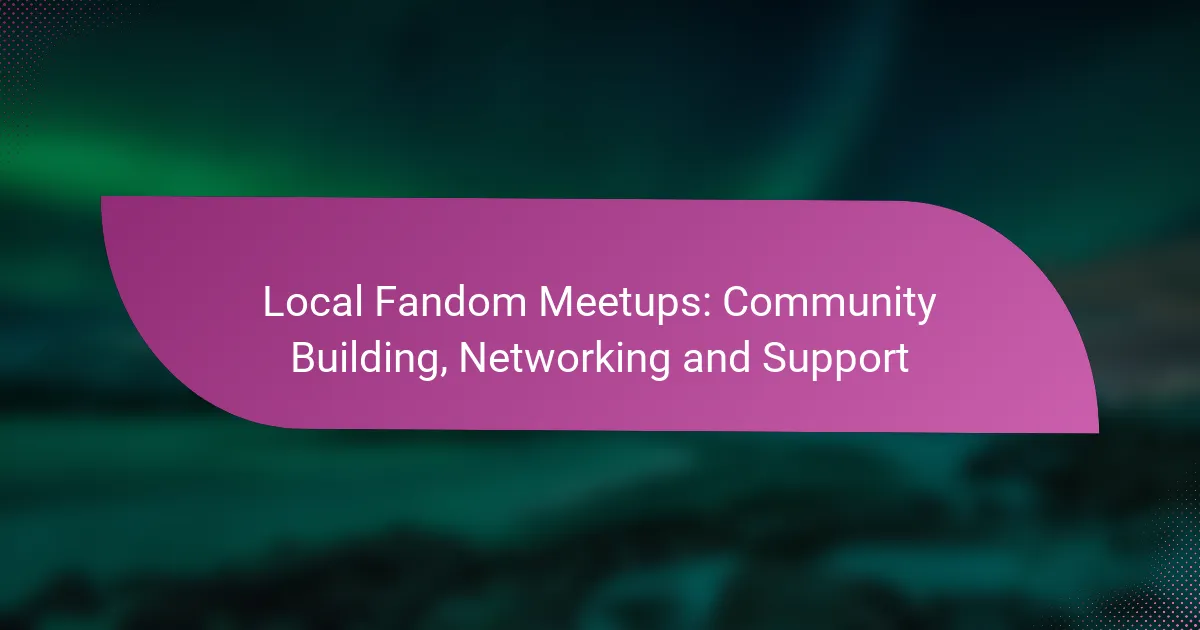Local fandom meetups serve as vibrant hubs for fans to connect, share their passions, and build supportive communities. By organizing events tailored to specific interests, these gatherings enhance networking opportunities and foster a sense of belonging among participants. Engaging with fellow enthusiasts not only strengthens community ties but also provides a platform for collaboration and shared experiences.
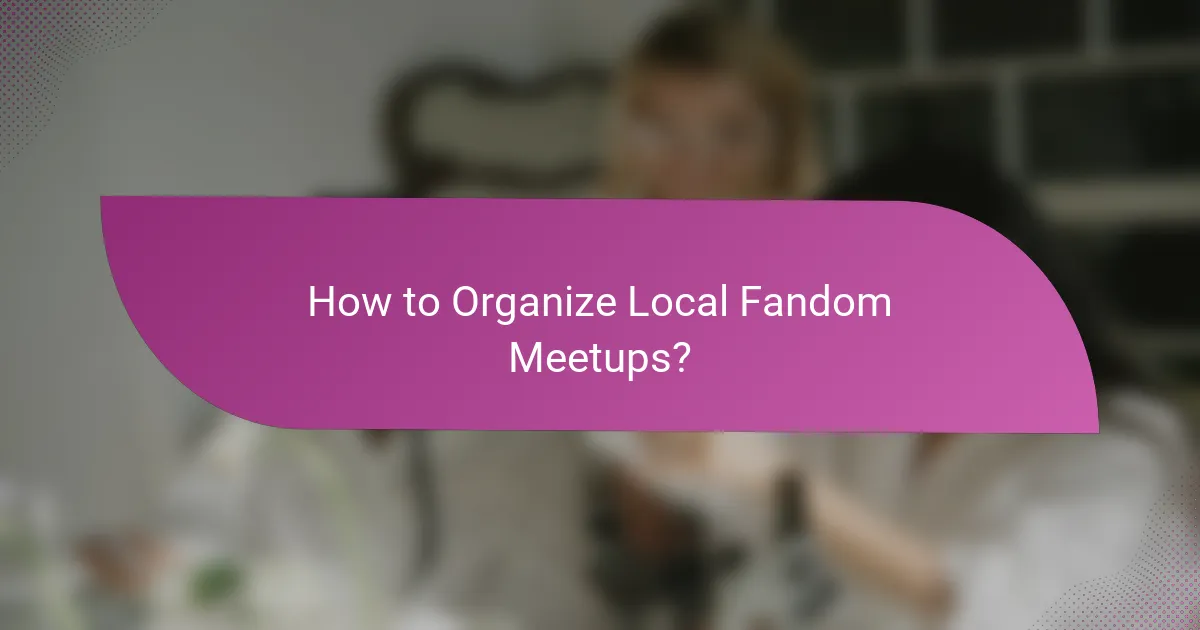
How to Organize Local Fandom Meetups?
Organizing local fandom meetups involves planning events that cater to specific interests within a community, fostering connections among fans. Key steps include identifying your audience, selecting an appropriate venue, and effectively promoting the event.
Identify target audience
Understanding your target audience is crucial for a successful meetup. Consider the specific fandoms or interests you want to engage, such as anime, gaming, or literature. This helps tailor the event to meet their preferences and needs.
Conduct surveys or engage in discussions within online forums to gauge interest levels and demographics. This will provide insights into what activities or themes would resonate most with potential attendees.
Select venue
Choosing the right venue is essential for accommodating your audience comfortably. Look for spaces that can host the expected number of participants, such as community centers, libraries, or cafes. Ensure the venue is accessible and has necessary amenities like seating and restrooms.
Consider the atmosphere of the venue as well; a place that aligns with the fandom theme can enhance the experience. For example, a comic book store may be ideal for a superhero meetup.
Set date and time
Selecting the right date and time can significantly impact attendance. Aim for weekends or evenings when most people are free. Check local calendars to avoid conflicts with major events or holidays that could draw potential attendees away.
Once you have a tentative date, consider creating a poll to finalize the time that works best for the majority. This inclusive approach can increase engagement and turnout.
Promote through social media
Utilizing social media is a powerful way to reach your target audience. Create event pages on platforms like Facebook, Twitter, or Instagram to share details and updates. Use engaging visuals and clear messaging to attract interest.
Encourage attendees to share the event with their networks, expanding your reach. Consider using relevant hashtags to connect with broader conversations within the fandom community.
Engage with local fandom groups
Connecting with existing local fandom groups can enhance your meetup’s visibility and credibility. Reach out to clubs, online communities, or influencers who share similar interests. Collaborating with them can help attract a larger audience.
Attend their events or participate in discussions to build rapport. This not only promotes your meetup but also fosters a sense of community among fans, making your event more appealing.
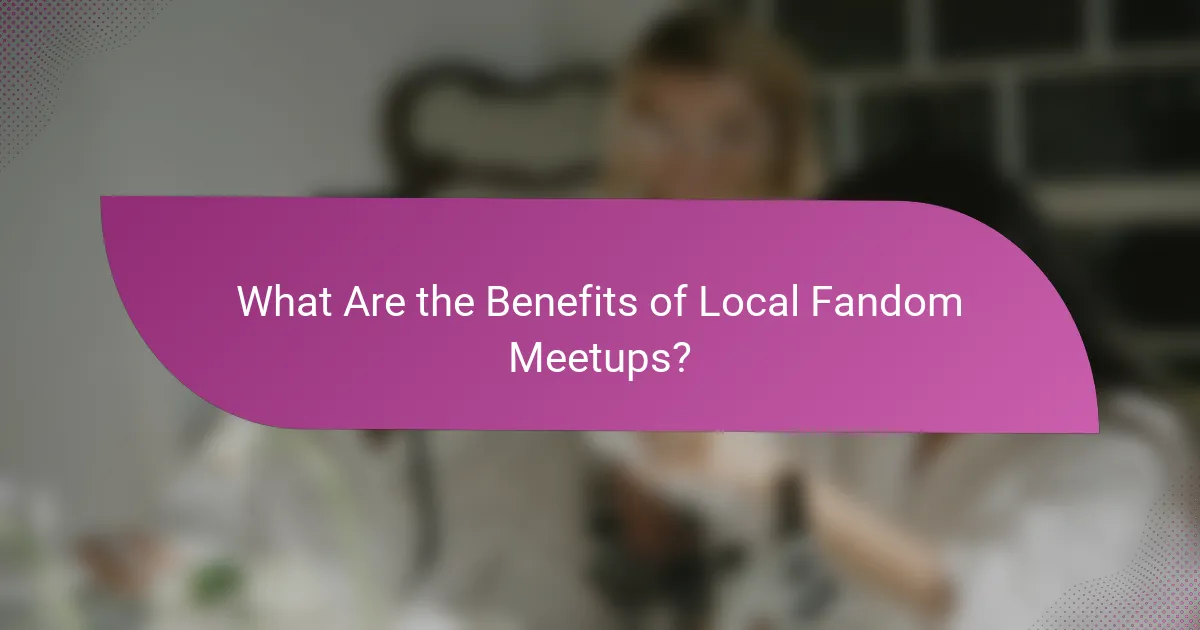
What Are the Benefits of Local Fandom Meetups?
Local fandom meetups offer numerous advantages, including enhanced community connections, networking possibilities, and support for shared interests. These gatherings foster a sense of belonging and provide a platform for individuals to engage with others who share similar passions.
Community building
Community building is a fundamental aspect of local fandom meetups. Participants often find a welcoming environment where they can form friendships and strengthen their social networks. Engaging in activities together, such as discussions or themed events, helps create lasting bonds among members.
To effectively build community, consider organizing regular meetups with varied activities. This could include game nights, movie screenings, or workshops. Consistency in scheduling encourages attendance and helps deepen connections over time.
Networking opportunities
Networking opportunities at local fandom meetups can lead to collaborations, partnerships, and even career advancements. Attendees can meet like-minded individuals who may offer insights, resources, or connections that enhance their personal or professional endeavors.
To maximize networking, come prepared with business cards or social media handles to exchange with others. Engaging in conversations about shared interests can naturally lead to discussions about potential projects or collaborations.
Support for shared interests
Support for shared interests is a key benefit of local fandom meetups, as they provide a space for individuals to express their passions openly. Members can share experiences, recommendations, and advice related to their fandoms, creating a supportive atmosphere.
Encouraging open dialogue and sharing personal stories can enhance this support. Consider creating discussion topics or themed sessions that allow participants to delve deeper into their interests and learn from one another.
Skill development
Skill development is often an overlooked benefit of local fandom meetups. Participants can learn new skills through workshops, tutorials, or collaborative projects that focus on specific aspects of their fandoms, such as writing, crafting, or gaming strategies.
To facilitate skill development, consider inviting guest speakers or organizing skill-sharing sessions where members can teach each other. This not only enhances individual abilities but also enriches the overall community experience.
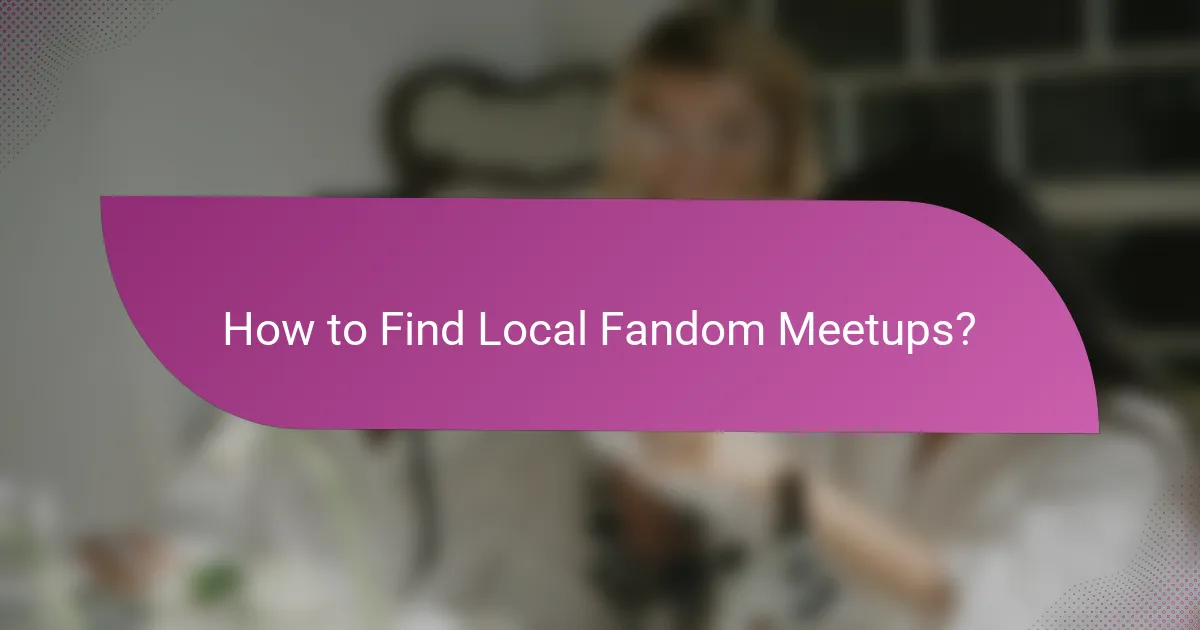
How to Find Local Fandom Meetups?
Finding local fandom meetups involves exploring various platforms and resources where fans gather. Utilizing websites, social media, and community boards can help you connect with like-minded individuals and participate in events that celebrate your interests.
Use Meetup.com
Meetup.com is a popular platform specifically designed for organizing local events and gatherings. You can search for fandom-related groups by entering keywords related to your interests, such as “anime,” “gaming,” or “comic books.” Joining these groups allows you to receive notifications about upcoming meetups in your area.
When using Meetup.com, consider the size and activity level of the group. Larger groups may offer more frequent events, while smaller ones can provide a more intimate setting for discussions and networking.
Check local event listings
Local event listings, such as community bulletin boards or city websites, often feature fandom meetups. These listings can include everything from comic conventions to book clubs. Regularly checking these resources can help you stay informed about events that may not be widely advertised online.
Additionally, local libraries and community centers frequently host fandom-related events, so keep an eye on their schedules for opportunities to connect with fellow fans.
Join fandom-specific forums
Fandom-specific forums are excellent places to find information about local meetups. Websites like Reddit or dedicated fan forums often have threads where users share details about upcoming events in various regions. Engaging in these communities can also lead to personal invitations to smaller gatherings.
When participating in forums, be proactive in asking about local meetups and sharing your own experiences. This interaction can help you build relationships and discover hidden gems in your fandom community.
Follow local influencers
Local influencers often promote fandom events through their social media channels. By following these individuals on platforms like Instagram or Twitter, you can gain insights into upcoming meetups and conventions. Influencers may also host their own events, providing additional opportunities to connect with fans.
Look for influencers who align with your specific interests, as they are more likely to share relevant information. Engaging with their content can also help you become part of a larger community and increase your chances of finding meetups.
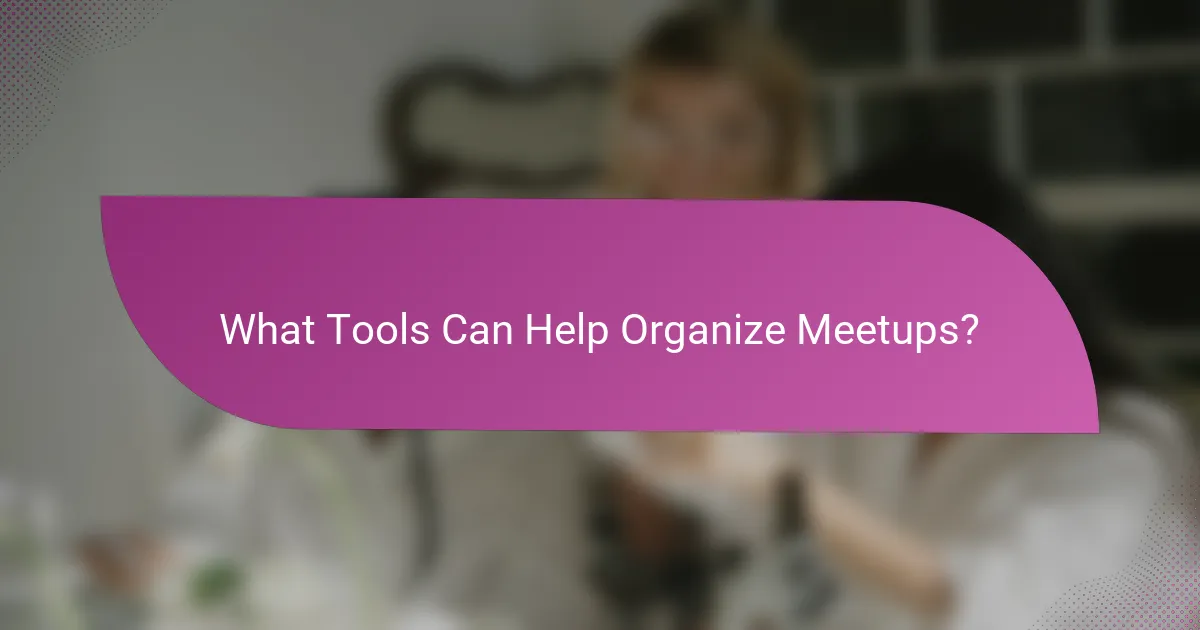
What Tools Can Help Organize Meetups?
Several tools can streamline the organization of meetups, enhancing ticketing, promotion, and community engagement. Utilizing the right platforms can significantly improve attendance and foster connections among participants.
Eventbrite for ticketing
Eventbrite is a popular platform for managing ticket sales and registrations for events. It allows organizers to create events, set ticket prices, and track sales in real-time. This tool is particularly useful for both free and paid events, as it offers features like customizable ticket types and promotional codes.
When using Eventbrite, consider setting up early bird pricing or group discounts to encourage attendance. Additionally, ensure to promote your event on social media to maximize visibility and reach a wider audience.
Facebook Events for promotion
Facebook Events is an effective tool for promoting meetups and engaging with potential attendees. By creating an event page, you can share details, updates, and engage with participants through comments and posts. This platform leverages your existing social network, making it easier to reach interested individuals.
To maximize the impact of your Facebook Event, invite friends and encourage them to share the event within their networks. Regular updates and reminders can keep the event top-of-mind for attendees, increasing the likelihood of participation.
Discord for community engagement
Discord serves as a robust platform for fostering community engagement before and after meetups. By creating a dedicated server, you can facilitate discussions, share resources, and build a sense of belonging among members. This tool is particularly effective for niche fandoms, where members can connect over shared interests.
To enhance engagement on Discord, consider hosting pre-event discussions or post-event feedback sessions. Utilize channels for different topics to keep conversations organized and encourage active participation from all members.
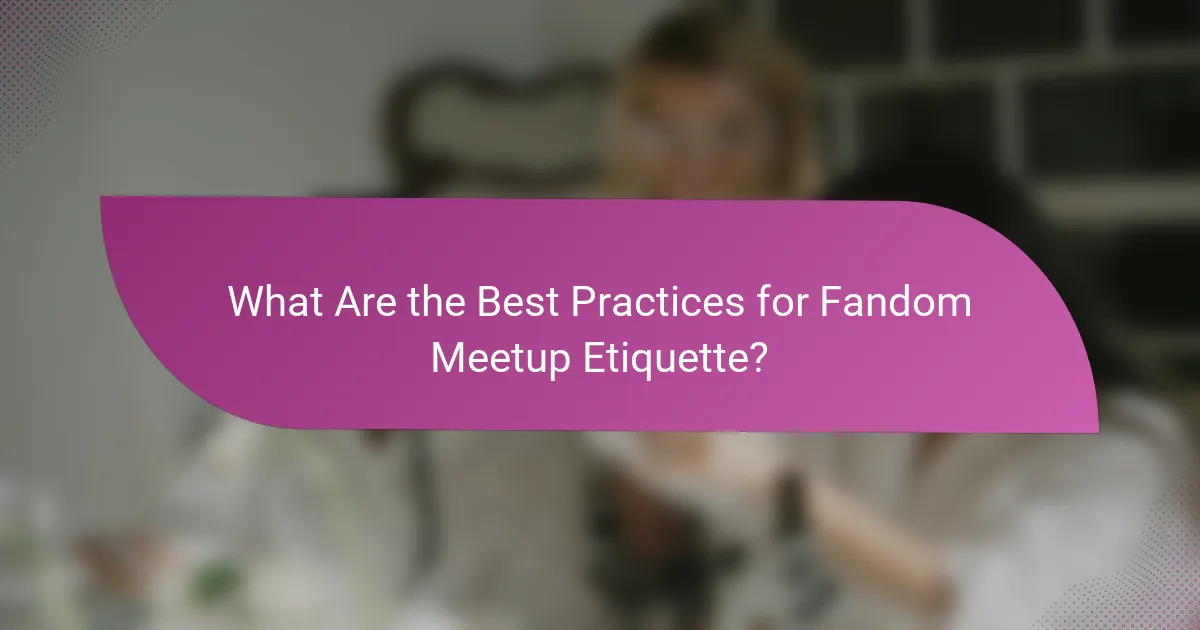
What Are the Best Practices for Fandom Meetup Etiquette?
Fandom meetup etiquette involves respectful communication, active participation, and consideration for others’ interests. Following these practices fosters a welcoming environment and enhances community bonding.
Be Respectful of Others’ Interests
Respecting diverse interests is crucial in fandom meetups. Everyone has unique preferences, and dismissing or belittling someone’s passion can create a negative atmosphere. Engage with enthusiasm, even if the topic isn’t your favorite.
Active listening is a key component of respect. Show genuine interest by asking questions and acknowledging others’ contributions. This fosters a sense of belonging and encourages open dialogue.
Communicate Clearly and Positively
Clear and positive communication helps avoid misunderstandings. Use straightforward language and be mindful of your tone, especially in group discussions. If disagreements arise, address them constructively rather than confrontationally.
Consider using non-verbal cues, such as nodding or maintaining eye contact, to show engagement. This reinforces a supportive atmosphere and encourages others to share their thoughts freely.
Participate Actively
Active participation is essential for a successful meetup. Contribute to discussions, share your insights, and volunteer for group activities. This not only enriches the experience for you but also for others.
However, balance is key. Avoid dominating conversations; instead, encourage quieter members to share their views. This inclusivity enhances group dynamics and strengthens community ties.
Follow Venue Guidelines
Every venue has its own set of rules. Familiarize yourself with these guidelines, whether they pertain to food, drink, or noise levels. Adhering to venue policies shows respect for the space and its staff.
If the meetup is in a public place, be mindful of your surroundings and the comfort of other patrons. Keeping noise levels reasonable and cleaning up after yourself are simple ways to demonstrate consideration.
Be Mindful of Time
Time management is vital during meetups. Start and end on time to respect everyone’s schedules. If discussions run long, gauge the group’s interest before extending the session.
For larger gatherings, consider setting an agenda or schedule. This helps keep discussions focused and ensures that all topics are covered, allowing everyone to contribute meaningfully.
